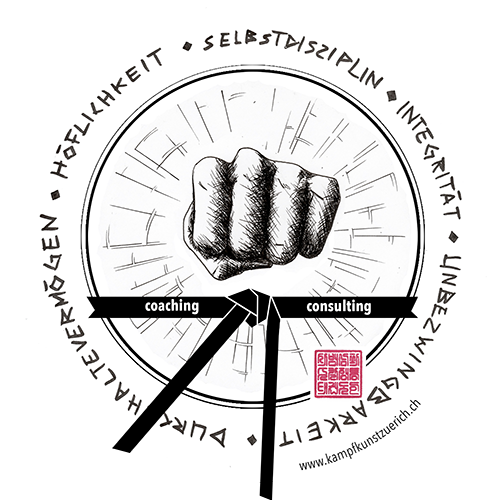What defines successful people? Maraike is a very smart and capable individual but early this…

Self-assertion: practice how to stand up for yourself
Do you find it difficult to set clear boundaries and to say no? Setting boundaries is a question of proper communication. And by that, we don’t mean stomping and shouting around.
If you lack assertiveness, you should train it: Because it pays off, in life as well as at work!
How often do you come across tasks, situations and people in the course of the day where you say «yes» even though you would have rather said no?
Yes, because you didn’t want to upset your boss or your dear colleague
Yes, because otherwise you would have let your best friend down
Yes, because … what if you missed an opportunity?
Yes, because only you know how to do it and no one else can actually deal with that matter as good as you so it is quicker done than explained
Yes, because your boss urgently needs you
…. and so on.
This is often caused by low self-esteem and a lack of self-confidence. (Read more about this in our blog: Improving self-confidence at work). By fulfilling the expectations of others, we mostly seek recognition and approval – which to a certain extent is okay.
It becomes far from ok, however, if you have burdened yourselves with more than you can handle and as a result you are frustrated, disappointed or even exhausted. Even worse, when you get the feeling that people are taking advantage of your kindness.
An occasional crossing of boundaries is normal when you share your life with others, but if this happens too often, it means that you have not defined your boundaries enough.
That is why it is so important to clearly acknowledge and communicate your own needs.
Most of the time, we expect others to understand on their own when they are going too far with their demands. But this does not happen because every person has individual boundaries and reacts differently to situations.
Up to here and no further: how?
Be aware of your own boundaries
What is important to you in your life? Which are your values and top priorities? In order to focus on what is really important to you, listen to your gut instinct. If you do not connect with your inner voice, you can easily drift from your actual path.
As soon as it is clear to you what you can/ want to achieve and what not, you can influence it, determine your direction and not just accept everything that happens to you. And when people in your surroundings know where you stand, they can respect your will.
Start talking about solutions instead of problems
It is up to you to decide on how to react to a situation. You can complain, seek the blame for your failures elsewhere, and go around in circles. Holding on in self-pity won’t help you. Alternatively, there is the way forward: move on and take control over your actions, change what you dislike and become every day a little better than the day before.
Start with the challenge that is the hardest for you.
You are a victim until you decide to step out of the role. Then you will be able to assert yourself better.
Are you complaining that your job is boring or that you have been stuck in the same position for the longest time? How much longer do you want to whine with your colleagues that your boss is unfair, that the processes in your unit are useless or that your team lacks resources? Who wants to hear that all the time?
Instead, take the initiative and suggest what could be changed to improve things in your work environment. Be creative, proactive, and solution-oriented. See challenges as growth opportunities.
Step by step, feeling how you can actually impact things, you will also gain self-confidence and the trust of the people around you, regardless of whether you are a young professional or an experienced manager.
Like in martial arts training, acknowledge your own limits and take on the challenge of overcoming them. The longer you practice, the more progress you make.
Stop looking for excuses
Whose fault is it, if you feel stuck or you are not doing well? In which situations do you feel taken by surprise, humiliated, hurt or angry?
Question your feelings: is that really justified? Your boss gave you an urgent task just before the end of your shift. Did you answer “yes, no problem” again? Does he know that you actually wanted to go to the gym and leave the office on time?
Are you struggling to find the right words and actually stick to your plans instead ? Why are you worried about telling your boss what you really want?
Tip: buy yourself some time before you answer out of lack of words – for example, “I don’t know exactly if I can manage: I’ll check my schedule first and get back to you in a moment”.
Tip: are you afraid of the consequences? Think: what could happen in the worst scenario? Not much, actually, when you think about it objectively.
Is the “danger” real or fabricated in your mind?
Fear mostly arises in the head. Courage as well.
Practice stating your point of view
Don’t confuse assertiveness with aggressiveness. Instead, clearly communicate your wants and needs.
Your boss appreciates you and your work. However, he won’t read your mind.
If you think you deserve a salary increase, a new assignment, a promotion… you name it -, you need to act.
Ask, state what you think with determination, also when you think something is wrong or you want to refuse it.
A constant “no” as well as “yes” given for granted, are counterproductive and quickly create a wrong impression: either that you tend to block every suggestion or initiative or that you never have anything of your own to contribute.
Those who do not have an opinion of their own are often less trusted and are also often perceived as less competent in terms of their subject matter. Bringing in your own point of view is therefore important, especially in a new workplace.
If it does not come natural, practice until it does.
Standing up for yourself can be learned. Use every opportunity, at work, with family and friends, without ending up in confrontation.
Strengthening your own assertiveness does not mean refusing others’ opinions, but rather looking for common ground or discussing differences with proper arguments.
Remember, it is much better for you and the others if they know what to expect from you or how to best deal with you: When everyone knows where you stand, they will understand, respect that and back off with their requests if they are not in line with your values and priorities.
Most people do not violate your boundaries on purpose, so, as soon as you communicate them clearly, you will avoid many uncomfortable situations.
Do not tolerate overstepping
If your boundaries are being violated on purpose however, defend them: react calmly but firm. No concessions. If you are lenient yourself, no one else will take you for real.
In addition, this will frustrate you, make you unhappy and demotivated. Not to mention the fact that your self-esteem will sink even lower! Do not let other determine your course.
Don’t take other people judgment for the ultimate truth
Those who do not support and value you, do not deserve you. Constructive feedback is a good basis for further development, but you should question destructive opinions. Become aware of your strengths, continue to pursue your goals and look for the right supporters. On your way, you need allies and mentors who inspire and empower you. Therefore, choose your environment carefully.
Conclusion:
- Explore your reasons for saying yes, or not saying anything at all: Make yourself aware of this and train – alone or possibly in coaching – to stand up for yourself.
- Communicate clearly why something does not work for you, without justifying yourself
- Offer solutions and alternatives
- Defend yourself when someone oversteps your boundaries, you have a right to do so
- Do not leave your path to fulfil other people expectations: you should move in alignment with your vision and values.
In the long term, clear boundaries will even improve your relationships, because the rules of the game are clear and you are much better off!
Start with small steps. Incorporate simple exercises into everyday life. Find one thing that could make a real difference to you or your team and then ask about it. For example, your company no longer allows you to work from home and you now have to go to the office every day. However, you don’t have a good feeling about it: the risk of corona infection is still too high for you. You want to continue working from your home office, even if you don’t dare to talk to your boss about the matter.
Prepare your arguments and be open to listen to the reasons of your counterpart: It’s not about winning or losing, but about finding a sensible solution which you both can live with. The objective of your conversation, what you want to achieve, is what you should focus on.
Becoming assertive is like exercising muscles. The more you do it, the stronger they get.
When things are not going the way you hoped, remember that failure is not a sign of weakness. It’s just a sign that you have gone beyond your own limits and have just learned something new!
These are steps that we train in our self-assertion courses. Would you like to start strengthening your assertiveness muscles with us? You will learn how to affirm yourself better and unleash power you did not even know you possessed. In our course we will help you to leave your comfort zone. As you become aware of your physical sources of strength and energy, you will free your mind, switching off limiting beliefs. The work-out will impact your posture. You will learn to assert yourself more easily and to cope with setbacks. Click here for our self-assertion course. Register now!



